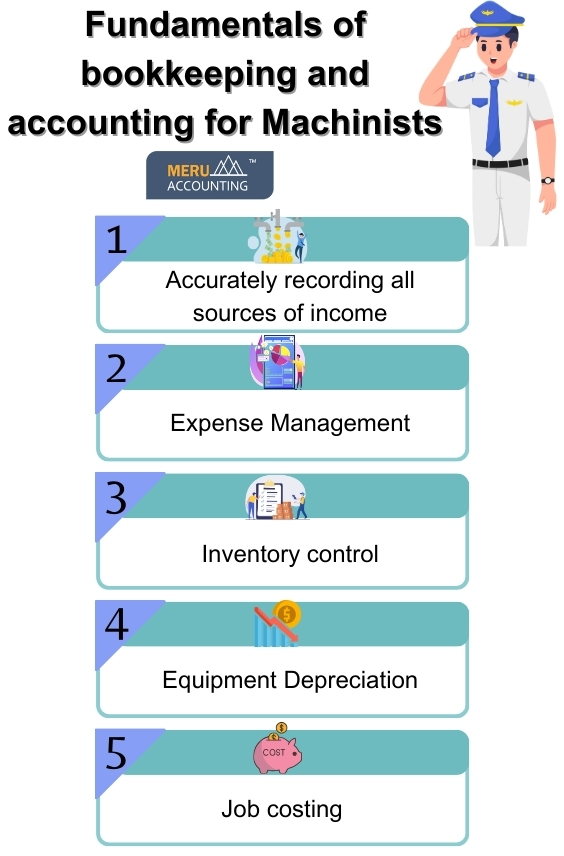
Bookkeeping and Accounting for Machinists
Machinists are highly trained individuals with a focus on using machine tools to make precise metal parts that are utilized in a variety of industries, including engineering, manufacturing, aerospace, and automobiles. Interpreting drawings, assembling and running machinery, and guaranteeing the precision and caliber of the final goods are all part of their job. Machinists need bookkeeping and accounting to keep track of their earnings, control spending, adhere to tax laws, and make wise business decisions.
Accounts Junction offers customized solutions made especially for machinists. These solutions include services like bank account reconciliation, tax return preparation and filing, income and expense tracking, financial report generation, and guaranteeing adherence to legal and regulatory obligations.
Fundamentals of Bookkeeping and Accounting for Machinists
For machinists to efficiently manage the financial parts of their business operations, bookkeeping and accounting are critical. The following are the fundamentals of bookkeeping and accounting that are unique to machinists:
Accurately recording all sources of income:
- These sources may include sales of equipment, machining services, or the production of machined products. Machinists can track their income to keep an eye on cash flow, evaluate the profitability of various projects or services, and make plans for future expansion.
Expense Management:
- The business operations of machinists involve a range of expenses, including rent, insurance, utilities, raw materials, and personnel compensation. Monitoring these expenses, figuring out where to cut costs, and making sure spending stays within budget are all necessary for effective expense management.
Inventory control:
- Machinists frequently keep track of their supplies of tools, raw materials, and completed goods. Tracking inventory levels, reducing stockouts or overstock scenarios, and making the most use of available resources all depend on effective inventory management. For financial reporting purposes, machinists can determine the value of their inventory with the use of accurate inventory records.
Job costing:
- Machinists may complete orders or specialized projects for customers, each with its own expenses and earnings. Job costing is the process of keeping track of all project-related expenses, both direct and indirect, such as supplies, labor, overhead, and equipment utilization. This aids machinists in precisely determining the profitability of projects and in making well-informed price selections.

What distinguishes accounting for machinists from general accounting?
Accounting for machinists is different from ordinary accounting in that it entails certain considerations and subtleties. The following are some significant variations:
-
Inventory management: Metal stock, tools, and consumables are among the raw materials that machinists frequently keep on hand. In contrast to many service-oriented companies, machinists must precisely monitor the amount, price, and use of these materials to make sure they have enough inventory to complete orders while reducing waste and storage expenses.
-
Job costing: Custom orders and projects, each with its unique set of expenses and requirements, are the usual job for machinists. Job costing entails keeping track of the direct and indirect costs related to each job, such as labor, materials, equipment utilization, and administrative costs, to assess project profitability and allocate expenditures precisely.
-
Equipment Depreciation: Lathes, milling machines, and CNC routers are just a few examples of the specialized tools and machinery that machinists use on a daily basis. Accounting for equipment depreciation entails acknowledging these assets' gradual decline in value, which has an effect on revenue, tax obligations, and the need to replace equipment.
-
Material Waste and Scrap: During the manufacturing process, machining processes may produce a certain quantity of material waste or scrap. In order to accurately reflect the true cost of manufacturing, material waste accounting entails keeping track of the cost of raw materials utilized, the value of scrap generated, and any associated disposal costs.
-
Costs of Quality Control: To satisfy customers and adhere to industry standards, machinists must guarantee the accuracy and quality of their work. Tracking the costs of inspection, testing, rework, and quality assurance procedures to preserve product quality and customer satisfaction is part of accounting for quality control costs.
-
Material and Labour Variance Analysis: Variance analysis looks for discrepancies between actual and budgeted or standard costs and identifies the causes of those differences. For machinists, examining labor and material deviations might reveal cost overruns, inefficiencies, or areas where manufacturing processes can be made more cost-effective.
What Accounting and Bookkeeping Services is Accounts Junction offering to Machinists?
In order to satisfy the unique requirements of machinists in the manufacturing sector, Accounts Junction provides a variety of specialized bookkeeping and accounting services. Machinists can benefit from a number of important services from Accounts Junction, such as:
Income Tracking:
- Custom orders, machining services, and product sales are just a few of the sources of income that Accounts Junction precisely tracks and classifies for machinists. This guarantees accurate recording and accounting for all income in the financial records.
Expense Management:
- Accounts Junction keeps track of and oversees the costs of all things related to machining operations, such as labor, utilities, raw materials, tools, and machine maintenance. Machinists can find ways to save costs and make sure that spending is under budget by keeping an eye on their expenditures
Inventory Control:
- Accounts Junction helps machinists keep track of raw materials, completed goods, and consumable inventory levels. This entails monitoring the amounts, prices, and movements of inventory in addition to adjusting inventory levels to maximize client demand and reduce storage expenses.
Job Costing:
- Machinists may keep track of the expenses related to any bespoke order or project by using Accounts Junction's job costing services. This helps machinists evaluate the profitability of projects and make wise business decisions by providing information on labor costs, material costs, machine utilization, and overhead charges.
Equipment Depreciation:
- By precisely documenting and monitoring the depreciation costs connected to their machinery and equipment, Accounts Junction assists machinists in accounting for equipment depreciation. This guarantees that the equipment's cost is appropriately distributed during its useful life and represented in the financial statements.
Tax Compliance:
- By preparing and filing tax forms, paying sales taxes (if applicable), and abiding by tax laws pertaining to business income, payroll, and equipment depreciation, Accounts Junction makes sure that machinists comply with tax requirements. This keeps machinists in good standing with tax authorities and helps them avoid penalties.
Financial Reporting:
- For machinists, Accounts Junction produces financial reports that include cash flow statements, balance sheets, and profit and loss statements. These reports give machinists insightful information about the company's financial performance, which they can use to evaluate profitability, spot patterns, and formulate strategic plans.
Although general accounting principles serve as a basis for financial management in many industries, machinists' accounting needs specific knowledge and experience to handle the particular issues and concerns that are specific to the manufacturing and machining industry. Through comprehension and modification of accounting procedures to suit the particular requirements of machinists, enterprises can enhance their fiscal outcomes, manage expenses, and secure enduring prosperity in the manufacturing sector.
In order to assist machinists in the industrial sector with their financial management and success, Accounts Junction provides a full range of bookkeeping and accounting services. Machinists can focus on their core businesses and leave their accounting and bookkeeping needs to us.
| # | Account Number | Account Name | Account Type |
|---|---|---|---|
| 1 | 2000 | Accounts Payables | Accounts Payable |
| 2 | 2000 | Accounts Payables:Accounts Payable | Accounts Payable |
| 3 | 1200 | Accounts Receivables | Accounts Receivable |
| 4 | 1200 | Accounts Receivables:1 A/R - Consulting | Accounts Receivable |
| 5 | 1000 | Bank & Cash Accounts | Bank |
Machinists Industry Faqs
Frequently Asked Insights
1. Why is bookkeeping crucial for machinists?
Bookkeeping is essential for monitoring client payments, tracking material expenses, and managing the upkeep costs of machinery to ensure accurate financial records.
2. What tax-deductible expenses apply to machinists?
Machinists can typically deduct expenses for machine tools, workshop rent, raw materials, and safety equipment.
3. How does bookkeeping help assess project profitability?
By evaluating the income and expenses associated with each project, bookkeeping allows you to determine profitability and make adjustments to your pricing strategy.
4. What accounting software is ideal for machinists?
Software like Xero or QuickBooks is highly effective for managing invoicing and tracking job-specific costs, helping streamline financial management.
5. How do I track raw material costs effectively?
A bookkeeping system can help track material purchases and usage, helping you minimize waste and stay within budget for each project.
6. Can bookkeeping assist in managing cash flow for large projects?
Yes, bookkeeping ensures that funds are available to cover material purchases and operational expenses until you receive client payments, helping maintain healthy cash flow.
7. What financial reports should machinists review?
Job cost summaries, income statements, and machinery maintenance cost reports provide critical insights into your financial performance and help manage expenses.
8. How can I keep track of payments from various clients or contracts?
We can implement a tracking system to organize and monitor payments from multiple clients, ensuring timely receipt and maintaining accurate financial records.
Hospitality industry has to provide better services to their customers to ensure their business has sustainability. The better they provide service, they have better chances of growing their business. There are broad categor...
Read MoreLast two decades have seen a considerable change in the trucking industry that has changed the working pattern of trucking companies. This has also changed the needs of the finance and accounting pattern of trucking companie...
Read MoreIndependent contractors will always try to find new projects with bigger ticket sizes to grow their business. Although most of the contractors may have a systematic way of workflow in their work areas, however, very few have...
Read MoreEvery small business owner understands the importance of bookkeeping in ensuring accurate accounting. This necessity for effective bookkeeping is especially critical in petrol stations, where a significant number of transact...
Read MoreA manufacturing company must use a predetermined quantity of raw materials, work-in-process, and finished goods in the course of its operations, and any ending balances must be fairly valued to be recorded on the balance she...
Read MoreOne of the primary functions of accounting is to monitor the business process. This is essential for all industries, including distribution and trading companies. Accounting, also known as internal control, is a tool used to...
Read MoreAccounts Junction provides the best insurance accounting experts for insurance agency accounting and bookkeeping. Our team has years of experience working with insurance agencies. We understand the unique requirements and pr...
Read MoreWhen you are running an event management company, you need to have a very organized approach. It is also important that you are managing your finances properly with proper management of bookkeeping and accounting. Many Event...
Read More
Accounts Junction's bookkeeping and accounting services
